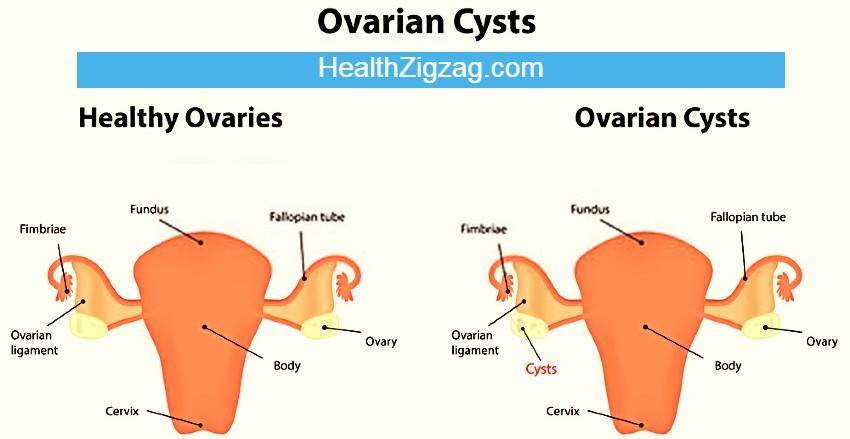
Treatment of a ruptured ovarian cyst
An ovarian cyst is a fluid-filled sac that forms on an ovary or inside an ovary. In some cases, the cyst can rupture and open (rupture). The rupture of a cyst can be treated in several ways. You may just need to track your symptoms. You may need to take some pain reliever medicine to relieve pain. In other cases, a cyst may require surgery.
What are ovarian cysts?

An ovarian cyst can emerge for different reasons. Most of them do not hurt. Treatment depends on whether the cyst is basic or complex. A normal cyst is simply a fluid-filled sac. A complex cyst can have solid areas, bumps on the surface, or multiple areas filled with fluid.
If a cyst ruptures, it may not cause any symptoms, or it may cause only mild symptoms, such as some pain. A cyst rupture that causes mild symptoms can usually be managed with pain relievers.
In some cases, a cyst rupture can perform more severe symptoms, such as pain in the lower abdomen and bleeding. Symptoms of this type need immediate treatment. [1]
Read Also: Symptoms of cysts on the breasts
Diagnosis of a ruptured ovarian cyst
Your health care provider or OB / GYN will diagnose this condition. Your healthcare provider will request your medicinal symptoms and history. Be sure to tell your provider if you know you have an ovarian cyst. They will also do a physical exam. This examination will probably include a gynecological examination.
If your healthcare provider thinks you have a cyst rupture, you may need to be tested. These tests can help rule out other possible causes of your symptoms, such as ectopic pregnancy, appendicitis, or a kidney stone. These tests may include the following:
- Ultrasound. Use sound waves to see the size, shape, and location of the cyst.
- Pregnancy test. Done to see if the cyst may be due to a pregnancy.
- Blood test. Done to check for low levels of iron in the blood (anemia) and infection.
- Urine analysis. Done to study other possible causes of your pain.
- Vaginal culture. Done to check for a pelvic infection.
- Computed tomography. This diagnostic test uses a series of x-rays and a computer to create a detailed image of the area.
You may need more tests to rule out other possible causes of your symptoms.
Healthzigzag will brief you now about the treatment of a ruptured ovarian cyst. Stay with us
Treatment of a ruptured ovarian cyst
Many women have ovarian cysts that are not complex. A non-complex cyst rupture can be treated with pain relievers. You may be told to monitor your symptoms over time. In some cases, you may need other follow-up ultrasounds. You may not need any other treatment.
If the cyst is complex, its care may be different. Complex cysts can cause the following:
- Blood loss causing low blood pressure or fast heart rate
- Fever
- Signs of possible cancer
If a complex ovarian cyst ruptures, you may need to be treated in the hospital. Your treatment may include the following:
- Intravenous fluids to replace lost fluid
- Careful monitoring of heart rate and other vital signs
- Monitoring the level of red blood cells (hematocrit) to see the ability of the blood to transport oxygen
- Multiple ultrasounds to check for bleeding inside the abdomen
- Surgery if your medical condition worsens or to look for signs of cancer
If you need surgery, your doctor may use the minimally invasive method. This is also known as laparoscopy. The doctor will make small incisions (cuts) in your abdomen while you are under anesthesia. Through these incisions, a small camera with light and other tiny instruments will be inserted. The doctor will monitor the bleeding and remove any fluid or blood clots that may be. You can then remove the cyst or the entire ovary. The instruments will then be removed. They will close your incisions and put a bandage on it. If the doctor does not resort to laparoscopy, the surgery will be done with larger incisions.
Talk to your doctor about the type of treatment that works best for you.
Post-procedure care
You and your medical team will design an appropriate follow-up plan for your particular case.
If the rupture is from a non-complex ovarian cyst, you will likely continue your care at home. You can use pain relievers to ease the pain as needed. The pain should relieve in a few days. Tell your healthcare provider right away if your pain gets worse, feels dizzy, or you have new symptoms. Schedule a follow-up visit with your healthcare provider if you need blood tests or imaging tests.
If a complex ovarian cyst has ruptured, you may need to stay in the hospital for a day or more. If your cyst no longer bleeds, you may be allowed to go home. You can use pain relievers to ease the pain as needed. You may need control imaging tests to make sure there is no bleeding.
In some rare cases, a ruptured ovarian cyst may be due to cancer. If so, you will need to continue with treatment prescribed by a healthcare provider specializing in cancer treatment. You may need surgery and other treatments.
Some women have more than one ovarian cyst. You can work with your healthcare provider to plan treatment if you have multiple cysts. A cyst that has not ruptured may need observation over time. In other cases, the cyst may need to be removed by surgery.
If you need surgery for your cyst, your healthcare provider will tell you how to prepare.
When to call your healthcare provider
- Call your healthcare provider immediately if you have any of the subsequent indications:
- Sudden, sharp abdominal or pelvic pain
- Pain along with nausea and vomiting. Published By Healthzigzag.com
Read Also:




